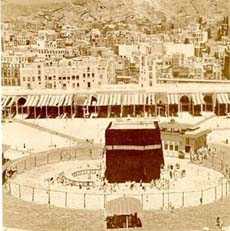The conquest of Makkah, 20 Ramadan - II
06/09/2006| IslamWeb
Abu Sufyaan honored
Al-'Abbaas, may Allah be pleased with him, appeared before the Prophet of Allah, sallalahu alayhi wa sallam, and submitted, "Abu Sufyaan is a person who loves honor, so would you please give him some special honor." At this he, sallalahu alayhi wa sallam, said, "He who enters the Sacred Mosque will be safe, he who enters the house of Abu Sufyaan will be safe, and he who shuts his doors upon himself will be safe." Abu Sufyaan felt elated.
The army on the move surged like an ocean. Different tribes had passed by with their tribal colors. Abu Sufyaan ascended a raised spot to witness the spectacle of the Muslim troops on the march and hurried back to Makkah ahead of all to announce: "He who enters the Sacred Mosque or my house will be safe." The Prophet of Allah, sallalahu alayhi wa sallam, wanted to avoid bloodshed at all costs. His exit from Makkah in a state of helplessness and then his victorious and glorious return must have been on his mind. This day he made a triumphant entry into Makkah with his head lowered giving thanks to Allah The Almighty. He, sallalahu alayhi wa sallam, then circumambulated the Ka'bah seven times mounted on his animal and then cleared the Ka'bah of idols. He then took the keys of the Ka'bah from 'Uthmaan Ibn Talhah, and entered the Ka'bah and prayed to Allah The Exalted. Following this the Prophet of Allah, sallalahu alayhi wa sallam, stood at the door of the Ka'bah, holding its frame, while the Quraysh arranged themselves in front of him in the courtyard filled with fear and shame.
Historic Address of the Prophet:
The Prophet said addressing them: "None has the right to be worshipped but Allah. He has fulfilled His Promise and help to His slave. He has alone overthrown all the Confederates. All the rites, privileges and claims to retaliation and blood compensation are beneath my feet except the custody of the Ka'bah and the giving water to the pilgrims. Even cutting down a green tree is not valid within the sanctuary. O you people of the Quraysh, Allah has abolished the haughtiness of paganism and the pride of lineage. Man comes from Aadam and Aadam came from clay. Allah the Almighty Says (what means): 'O mankind, indeed We have created you from male and female and made you peoples and tribes that you may know one another. Indeed, the most noble of you in the sight of Allah is the most righteous of you. Indeed, Allah is Knowing and Acquainted'. [Quran, 49:13]
O Quraysh! what do you think I am about to do with you?" "We hope for the best," they replied, "You are a noble brother, son of a noble brother." The Prophet of Allah said in reply, "I say to you what Yoosuf (Prophet Joseph, may Allah exalt his mention) said to his brothers: 'Have no fear this day, go your way for you are all free'."
The address being over, the Prophet, sallalahu alayhi wa sallam, went up to
The Truth came and Falsehood vanquished
Destruction of idols installed in the Ka'bah meant the destruction of the idols all over
After the conquest of Makkah, the Prophet, sallalahu alayhi wa sallam, announced throughout the land that nobody becoming a Muslim was allowed to keep an idol in his house. Following this he sent a few parties to destroy idols installed in the area around Makkah. He sent Khaalid ibn Al-Waleed, may Allah be pleased with him, at the head of thirty soldiers to break 'Uzzaa, the idol of Banu Kinaanah and to pull down its temple. Khaalid ibn Al-Waleed went and broke 'Uzzaa to pieces and razed its temple to the ground. 'Amr ibn Al-'Aas, may Allah be pleased with him, was sent to destroy Suwaa', the idol of Banu Huthayl. When 'Amr ibn Al-'Aas reached the spot, the priest said, "How will you be able to overpower it?" 'Amr said, "Just watch." Saying this he entered the temple and broke the idol to pieces. Sa'd ibn Zayd was sent to Qadeed to destroy Manat. The priests were sure the Muslims would fail in their task but they saw with their own eyes the believers break the idols and pull the temple down. All idols and temples were destroyed.
The first priority being completed, the Prophet, sallalahu alayhi wa sallam, resumed his mission of preaching Islam through Muslim missionaries and sent them near and far.

